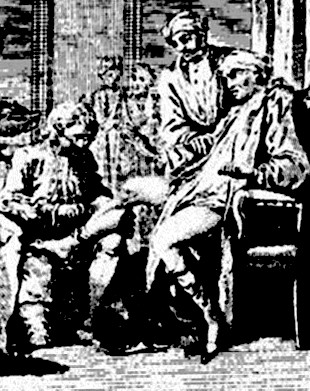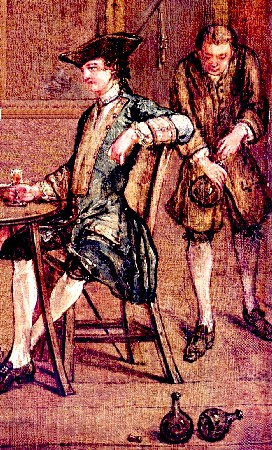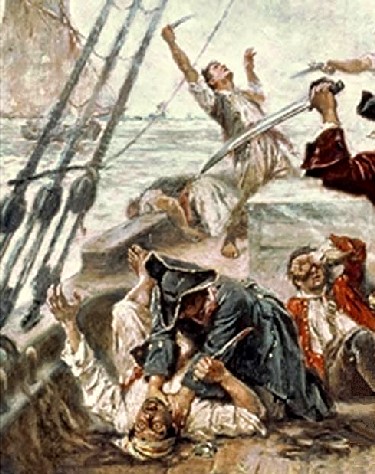
Amputation Page Menu: 1 2 3 4 5 6 7 8 9 10 11 12 Next>>
Amputation During the Golden Age of Piracy, Page 4
Patient Preparation
Being a complex operation with a high risk of mortality, it was important to prepare the patient before the amputation proceeded. We begin with the advice the patient received, look at what the patient might be given to drink or eat before the operation and finish with a look at a period form of anesthesia.
Patient Preparation: Advice

Advising a patient, from "County Infirmary at Northampton," 1744
The surgeons of the time had the onerous duty all surgeons have; informing the patient of the seriousness of the operation and the chance of the patient's surviving it. Not having a vast pool of clinical statistics to draw upon, they found more personal ways of conveying the danger.
John Woodall advised, "If you be constrained to use your Saw, let first your Patient be well informed of the eminent danger of death by the use thereof; proscribe him no certainety of life, and let the worke bee done with his owne free will, and request; and not otherwise. Let him prepare his soule as a ready sacrifice to the Lord by earnest praiers, craving mercie and help from the Almighty, and that heartily."1
William Clowes, a sea and military surgeon in the late 17th century, suggested that the amputation patient "...have administered unto them some good exhortation concerning patience in adversity, to be made by the minister or preacher. And you shall likewise advertise the friends of the patient that the work which you go about is great, and not without danger of death, for that many accidents and evil symptoms do happen which in such causes many times do admit no cure…"2
Somehow the clinical statistics sound preferable.
1 John Woodall, the surgions mate, p. 172; 2 William Clowes, Selected Writings of William Clowes, p. 84-5
Patient Preparation: Diet
It is a widely-held belief that alcohol would be used during this time as a form of anesthesia. It seems to me that

Wine before an operation? Taken from "Interior mit
Figuren"
by Marcellus Laroon the younger
this would be most foolish if administered to the point you would probably want to avoid feeling any pain. People's responses to alcohol are notoriously unpredictable. Many become belligerent, which would seem to me to be the opposite of what would be desired by the physician during a somewhat delicate operation. In fact, I don't find much support for giving patients alcohol before an operation so much as I find it for administering it afterwards. However, the primary evidence I have found to support the idea of giving the patient drink before surgery is during the operation of amputation.
In support of this, Matthias Gottfriend Purmann advises, "When you resolve to set upon this Operation, having all things necessary in a readiness upon a Table near you; first give the Patient a good Cordial, and encourage him by proper words, to suffer with patience what will conduce to his future well-being."1 You will notice that Purmann says "a good Cordial," not several.
In his book Abstractum Chirurgæ Marinæ, John Moyle likewise suggests a cordial drink. "In the mean time let a drachm of Cordial be given to the man to keep up his Spirits."2 A drachm (or 'dram') is about 1/8 of a fluid ounce, although we can't say for certain how exact Moyle's measuring of such a thing was. Moyle also recommends at the completion of the operation, with a very telling comment which explains why alcohol was not given before hand, at least by Moyle.
"This done [the limb removed, the patient bandaged and set aside to rest], let him have another Cordial drachm, but have a care of too much, lest it inflame him, and make his blood more fluid: And have an Eye lest his Messmates come with their bottle, and prejudice him with their kindness, as I have sometimes seen"3.
In further support of the idea of limiting alcohol intake for this challenging and painful operation, note how Pierre Dionis advises the surgeon to prepare his patient. "The Operator is to encourage the Patient, and having given him half a Glass of Wine, to enable him the better to endure his Pain…"4 One can readily infer from this that wine given pre-operation is meant to calm the patient slightly, not inure him to the coming pain.
William Clowes provides what seems a rather bizarre dietary prescription containing wine. "And after the body is well prepared and purged, then the same morning that you attempt to cut off the member, be it leg or arm, let him have some two hours before some good comfortable caudel [caudal - a syrupy gruel containing spices and wine or ale] or other broths, according unto the direction of the Physician or Surgeon, only to corroborate and strengthen his stomach…"5
Purging the body (in this case, most likely by emetic) seems to make some sense. Feeding the patient a syrupy gruel seems rather counter-intuitive, however. One might think that some patients might respond to having a limb removed in front of them by emptying the contents of their stomach. However, the celebrated French surgeon Ambroise Paré concurs with this opinion, expanding on the pre-op menu. "The first care must be of the patients strength, wherefore let him be nourished with meats of good nutriment, easie digestion, and such as generate many spirits; as with the yolkes of Egges, and bread tosted and dipped in Sacke [fortified wine] or Muskedine."6 That sounds like an awfully full stomach upon which to have a limb removed.
1 Matthias Gottfried Purmann, Churgia Curiosa, p. 210; 2 John Moyle, Chirurgus Marinus, p. 24; 3 Moyle, p. 28; 4 Pierre Dionis, A course of chirurgical operations: demonstrated in the royal garden at Paris. 2nd ed., p. 411; 5 William Clowes, Selected Writings of William Clowes, p. 85; 6 Ambroise Paré, The Apologie and Treatise of Ambroise Paré, p. 149
Patient Preparation: Anesthesia?
"Some surgeons expanded their indications for amputation, often urged on by soldiers and especially sailors, who recognized amputation was easier 'in the heat of fight'; that is, when adrenaline levels were high. Sailors also feared that if put down in the hold to await treatment, their damaged limbs would be nibbled by rats." - John Kirkup, The Evolution of Surgical Instruments; An Illustrated History from Ancient Time to the Twentieth Century, p. 378
While anesthesia was yet to be discovered, Golden Age of Piracy surgeons had discovered a natural substitute: adrenaline. They didn't call it that, but they and the patients who were operated upon recognized that things didn't hurt quite so

Who would notice amputation after this? Taken from
"The Capture of the Pirate,
Blackbeard" by Jean Leon Gerome Ferris
much immediately following the excitement of battle. (Not to mention the patients interest in avoiding rats, as Kirkup notes.) The surgeons also believed amputation was best performed before infection set in and the patient became ill due to their wounds. Richard Wiseman provides a fascinating and vivid account of this.
"And then [amputation] must be done in its proper time, that is to say, suddenly upon the receipt of the Wound, before the Patient's Spirits be over-heated either with Pain, Fever, &c. Of the necessity of doing it speedily I shall give you a remarkable Instance.
A Scottish Souldier was brought to me out of the field at the Battel of Worcester shot with a Musket-bullet into the Elbow-joint, which fractured not only the ends of the Radius and Ulna, but likewise that of the Adjutorium. Upon sight whereof I called Will. Clarke (now a Chirurgeon at Bridgenorth) and my other Servants about me, to cut off the Arm, and the while I endeavoured to encourage the Souldier to endure it. In answer thereto he only cried, Give me drink, and I will die. They did give him drink, and he made good his promise and died soon after; yet had no other Wound than that.
By which may be perceived the danger in delaying this work to the next day, when the foresaid Accidents have kept them watching all night, and totally debilitated their Spirits. Which happens not, if it be done in the heat of Fight; for then, while they are surprised and as it were amazed with the Accident, the Lim is taken off much easier: and if it be the Arm, some of them will scarce be kept in the Hold while the Ships is close engaged in Fight."1
John Moyle agrees, explaining that amputation is, "...better done now in time of Fight whilst the Blood is hot, and there is Strength; then afterward when the Fever or other ill symptoms are come on. I had always my apparatus and first intentions ready (at such time as this) knowing there would be occasion for them."2
John Atkins provides another observation about the mental state of the patient left to await amputation. "Heat and Surpize in Action makes it the properest Time for amputating, Men meeting their Misfortunes with greater Strength and Resolution than when they had spent a Night under Thought and Reflection."3
1 Richard Wiseman, Of Wounds, Severall Chirurgicall Treatises, p. 420; 2 John Moyle, Memoirs: Of many Extraordinary Cures, p. 118-9; 3 John Atkins, The Navy Surgeon, p. 131

